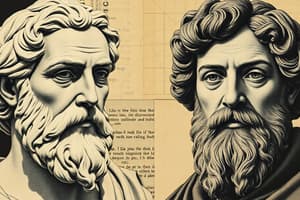Podcast
Questions and Answers
What was Socrates' reason for seeking wisdom according to the Delphic oracle?
What was Socrates' reason for seeking wisdom according to the Delphic oracle?
- To prove he was the wisest man in Athens
- To corrupt the youth further
- To fulfill a personal ambition
- To discover whether he was truly the wisest of men (correct)
How does political philosophy emerge according to the content?
How does political philosophy emerge according to the content?
- By enforcing laws strictly and without debate
- By accepting societal norms without questioning them
- Through historical account analysis only
- Through the examination of societal assumptions (correct)
What distinguishes Thucydides' method of reporting history?
What distinguishes Thucydides' method of reporting history?
- He judged the actions of historical figures
- He reported facts without personal interpretation (correct)
- He focused only on moral lessons from history
- He included fictional dialogues for clarity
What was the outcome for the Melians during their debate with the Athenians?
What was the outcome for the Melians during their debate with the Athenians?
What personal misfortune did Thucydides face during the Peloponnesian War?
What personal misfortune did Thucydides face during the Peloponnesian War?
Flashcards are hidden until you start studying
Study Notes
Socratic Trial and Philosophy
- Socrates faced trial for allegedly denying the gods and corrupting Athenian youth.
- He claimed the Delphic oracle, linked to Apollo, prompted him to discover whether he was indeed the wisest man.
- Law mandates obedience, but it also allows for critical dialogue and questioning of its commands.
- Socrates encourages the examination of social practices, demonstrating that every custom is open to scrutiny.
Political Philosophy and Society
- Political philosophy transcends societal norms by questioning fundamental beliefs and assumptions.
- The development of political philosophy occurs when society reflects on its inherent principles.
Thucydides as a Historian
- Thucydides is recognized for his impartial historical analysis, referred to by Rousseau as an exemplary historian.
- He presented historical events factually, refraining from moral judgments, thus allowing readers to interpret the significance.
- His account of the debate between the Athenians and Melians mimics a Platonic dialogue but concludes tragically with the execution of the Melians after their defeat.
Relationship Between Philosophy and Politics
- Unlike Socrates, who would interrogate arguments to reveal deeper philosophical truths, Thucydides' narrative lacks this dialogical aspect.
- The essence of partisanship lies in the belief in freedom of choice regarding how to live, yet there is recognition of the limitations imposed by necessity.
Thucydides' Background
- Author of "History of the Peloponnesian War," little else is documented about Thucydides’ life.
- He served as an Athenian general, suffering defeat at Amphipolis in 424 BC against the Spartan general Brasidas.
- Following his defeat, Thucydides was exiled from Athens for twenty years.
- He survived a plague in Athens, which he detailed in his historical accounts.
Studying That Suits You
Use AI to generate personalized quizzes and flashcards to suit your learning preferences.




